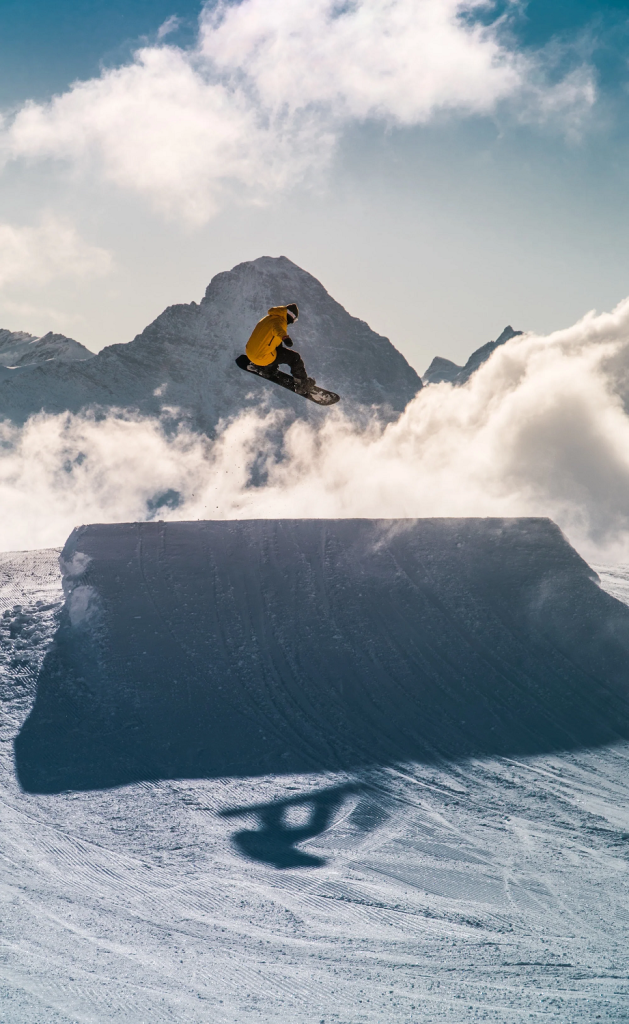
Winter sports enthusiasts are often faced with the decision of whether to ski or snowboard. Both sports offer unique experiences and challenges, but there are distinct benefits to choosing one over the other. In this article, we will explore the benefits of riding a snowboard versus skiing and help you decide which sport is right for you.
Learning Curve
The learning curve for snowboarding is often steeper than skiing. Snowboarding requires riders to learn a new skill set, such as balance, edge control, and body positioning. However, once these skills are mastered, snowboarding can be more intuitive and offer a more natural flow on the mountain.
Skiing, on the other hand, has a more gradual learning curve. Skiing relies more on leg strength and coordination, which many people already possess. Additionally, skiing offers a more stable and balanced platform for beginners, making it easier to maintain control and build confidence.
Terrain
Both snowboarding and skiing offer access to a wide range of terrain, including groomed runs, moguls, terrain parks, and backcountry. However, the style of riding differs between the two sports.
Snowboarding is often associated with a more freestyle and playful riding style, with an emphasis on tricks and jumps in terrain parks. Snowboarders often ride with a wider stance, which allows for more maneuverability and control while riding switch.
Skiing is often associated with a more traditional and technical style, with an emphasis on carving and edging on groomed runs. Skiers often ride with a narrower stance, which provides stability and control while making turns.
Accessibility
Snowboarding is often considered to be more accessible to a wider range of age groups and ability levels. The learning curve may be steeper, but once the basics are mastered, snowboarding can provide more freedom and creativity on the mountain.
Additionally, snowboarding equipment is often more user-friendly and easier to manage. Snowboard boots are more comfortable and easier to walk in than ski boots, and snowboards are typically easier to carry and transport.
Skiing, on the other hand, can be more challenging for beginners due to the narrower stance and reliance on leg strength. Skiing equipment can also be more cumbersome, with heavier and more rigid boots and skis.
Injury Risk
Both snowboarding and skiing come with inherent injury risks, but the types of injuries can differ between the two sports. Snowboarding is associated with more upper body injuries, such as wrist fractures and shoulder separations, due to the frequent falls on outstretched hands.
Skiing, on the other hand, is associated with more lower body injuries, such as knee and ankle injuries, due to the twisting and torqueing movements required for turning and edging.
However, both sports can be enjoyed safely with proper technique, protective gear, and awareness of one’s limitations.
Fitness Benefits
Both snowboarding and skiing offer a great workout and can improve overall fitness levels. Snowboarding requires strong core and leg muscles, as well as good balance and cardiovascular endurance. Skiing also relies on strong leg muscles and coordination, as well as upper body strength for pole planting and balance.
Additionally, being out in the fresh air and sunshine can provide mental health benefits, such as reducing stress and improving mood.
Social Aspects
Both snowboarding and skiing offer social opportunities and a sense of community. Ski resorts often offer group lessons and guided tours, which can provide opportunities to meet new people and share experiences.
Additionally, both sports have their own culture and fashion, which can provide a sense of identity and belonging. Snowboarding is often associated with a more youthful and alternative culture, while skiing has a more traditional and sophisticated image.
Equipment Costs
The cost of snowboarding and skiing equipment can vary depending on the quality and brand. However, in general, snowboarding equipment is often less expensive than skiing equipment.
Snowboarding requires a snowboard, boots, and bindings, while skiing requires skis, boots, bindings, and poles. Snowboarding boots are often more comfortable and affordable than ski boots, and snowboards are typically less expensive than skis.
Conclusion
Choosing between snowboarding and skiing ultimately depends on personal preferences and goals. Both sports offer unique experiences and challenges, but the benefits of snowboarding include a more intuitive riding style, greater accessibility, and lower equipment costs. Skiers may enjoy a more traditional and technical style of riding, with a more gradual learning curve and greater stability on groomed runs.
Regardless of which sport you choose, both snowboarding and skiing offer great workouts, social opportunities, and a chance to enjoy the beautiful winter landscape.

